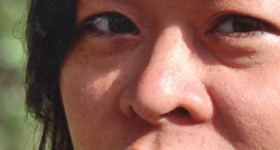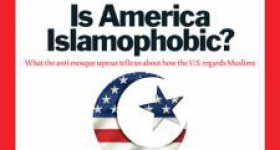On one level, this story lies firmly between the discrete spheres of American and Japanese law. It's a sad situation, but one in which the most outstanding legal implication is Japan's possible commitment to the 1980 agreements put forth at The Hague.
What is curious about the Savoie saga, however, has been its mainstream network coverage, which utterly elides the story's racial dimension and plainly skews to Christopher's corner. The two are linked: remove any awkward dialoguing about race and Noriko Savoie is a criminal, a woman illegally absconding with her children to Japan -- in other words, precisely the way she has been characterized by CNN and the like. That Noriko, however, has returned to her native country from the United States -- where she felt her life neither viable nor adequately protected by the law -- demands of us a second characterization, as well as an uncomfortable question: Why should Noriko Savoie stay in Tennessee, in the absence of any sizable Japanese American community, where she moved in the throes of a dying marriage?
What the media's unbridled chastisement of Noriko -- and Japan -- has revealed is our investment in the notion that America is somehow past that sort of question. More specifically, it reveals a deep-seated indignation that transitioning to life in the United States might inherently be problematic for contemporary immigrants, especially those who are nonwhite.
The mythos of assimilation -- the immigrant who rises from rags to riches, the worn inscription on the Statue of Liberty -- tells us that white America is in fact a patchwork of immigrants, a stew of color, culture, and appearance cooked to homogeneity. Implicit in that framework is the idea that, when it comes to American citizenship, one's unique racial and cultural markers are -- and should be -- the price of admission.
Noriko Savoie is a wrench in those cogs. A Japanese woman in the Deep South without adequate English skills for employment, let alone a working knowledge of America divorce court proceedings, Noriko had nothing but the specter of the American Dream and the right to live in Tennessee just as long as her husband lived there too. She decided to relinquish both to raise her children in Japan -- a decision that apparently warrants her a lambasting by American news outlets and insinuations that her husband, who moved the family to Tennessee from Japan in June 2008 and had remarried by the next February, is some sort of martyr for fathers' rights.
Unsurprisingly, the Japanese legal framework protecting Noriko has been cast as deviant, archaic, and underhanded. She and the many other Japanese women with similar stories come out even worse; here, Christopher's lawyer seems hellbent on relegislating "buyer's remorse" laws binding Asian wives to their American husbands.
It's myopic to interpret the Savoie case as merely a reflection of international dissonance, and not an indictment of the way we understand race and assimilation to the United States. Of course, it remains on one level a sad story about a family -- and one in which each media angle seems to claim the best interests of the Savoie children. But it would be unfair to Noriko Savoie not to see in it the messy ways in which the complexities of immigration and assimilation are anchored to race. It is in this space, literally at the borders of Asian America, in which I hope to write for this blog.










Comments